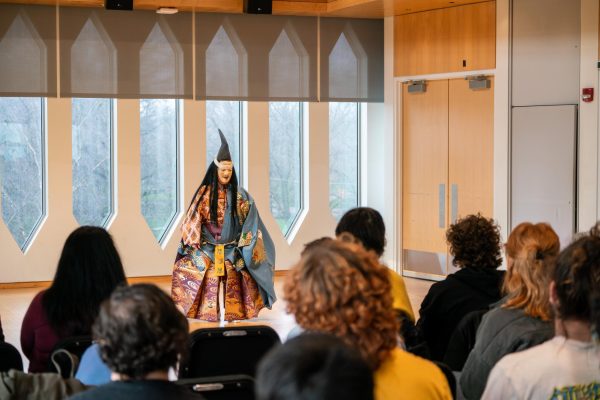Oberlin Emeritus Professor Recognized for Grafton Productions
The Ohio Arts Council recently announced that Phyllis Gorfain, Oberlin Professor of English Emerita, had won its 2019 Ohio Arts Administration Award. This award is one of several categories of the Governor’s Award for the Arts in Ohio. Gorfain was nominated for her role in founding Oberlin Drama at Grafton, a theater group that operates within the Grafton Correctional Institution, located about 20 minutes from Oberlin.
ODAG helps to put on inmate-acted plays inside Grafton, providing incarcerated people the opportunity to engage with theatrical works in collaboration with Oberlin students and volunteers. While the group grew from Gorfain’s earlier work, she is quick to insist that its roots come from all its participants, not the work of any one person.
“In some ways, [this award] made me feel uncomfortable,” Gorfain said. “But I’ve worked my way to embracing [it] because I love the fact that because it’s an award for arts administration. It first and foremost is an award for ODAG as an organization.”
Gorfain was initially introduced to prison academic work through two personal friends — Oberlin professors teaching an expository writing class to inmates. In 2006, they invited Gorfain, who holds a doctorate in Shakespeare studies, to read a Shakespearean play to their class.
Around the same time, Gorfain attended a Shakespearean scholars conference, where she found herself at a showing of the documentary Shakespeare Behind Bars, written and directed by Hank Rogerson. The documentary follows a year in the life of an acting troupe of inmates, as they prepare to stage The Tempest in a Kentucky prison. Two years later, Gorfain retired from Oberlin and began to organize the group that would eventually turn into ODAG.
The group’s mission is nuanced and complicated. While ODAG’s official statement focuses on preparing inmates for successful reentry to society, Gorfain elaborated that this is only part of the group’s goal.
“Our goal is deep personal and social change,” Gorfain said. “Zero recidivism will follow from that … one of our goals is that by doing this program, people will … contribute to the society as returned citizens and, as we put it, to be able to go home and stay home. So we can put it in terms of recidivism and there’s nothing wrong with that, but it’s too narrow a goal. In other words, our goal is much more immense.”
ODAG works towards this social change by providing Grafton inmates with a nurturing environment where they can be vulnerable and safe while pursuing new experiences. College senior Abby Bordin volunteers with the group and says that the atmosphere it creates sets it apart from other forms of theater people may be exposed to.
“The thing I liked the most about doing ODAG is that it really is a learning experience and a community-building experience,” Bordin said. “We call it — it’s so cheesy — we call it the ODAG family [because] we care deeply about each other’s artistic and creative successes. And that’s just a really wonderful environment to be around.”
The program also challenges many stereotypes of inmate life, not for the benefit only of the performers or of an outside audience, but also in opening up the way other inmates think about their experiences. Some of these productions include male prisoners in female roles, in contrast to the stereotypical hyper-masculine behavior expected in prison.
“The reception is [always] so positive,” Bordin said. “The most feedback that I’ve ever heard from the general population shows is new guys will come to the first rehearsal after that show and say, ‘Hey, I saw the show, and I want to be a part of that.’ I hear that so much more than I hear anything that’s mocking or in any way putting down anything that’s happened. It’s wonderful, and I think that goes to show there are so many subtly dehumanizing stereotypes about people who [are] in prison.”
Working with the prisoners has also had a strong impact on ODAG’s student volunteers. College senior Joey Flegel-Mishlove said that the hands-on experience has shaped how he thinks of prison-related issues.
“I think it’s made a lot of the things that I thought I knew very real and given a face to people [facing these issues],” he said. “I could say abstractly that I thought the American criminal justice system is broken in innumerable ways, but I didn’t know it in the way that I do now, and I didn’t [attribute] a human characteristic to it.”
ODAG is in the process of preparing their next show, The Merchant of Venice, for sometime this year, and Gorfain is set to receive her award May 15 at the Governor’s Awards for the Arts in Ohio.









